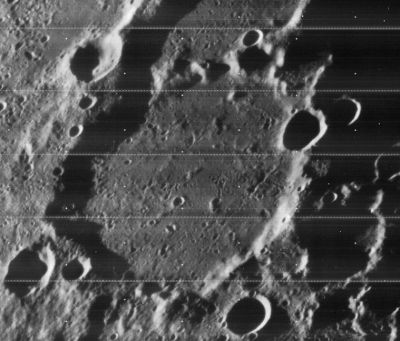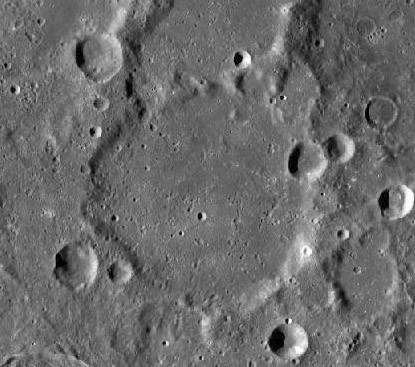Kästner
Contents
Kästner
|
Lat: 6.8°S, Long: 78.5°E, Diam: 108 km, Depth: 3.2 km, Rükl: 49 |
Table of Contents


LO-IV-178-h1; LRO-WAC mosaic. Kästner is the roughly elliptical formation in the center. The continuation at the top is Kästner G.
Images
LPOD Photo Gallery Lunar Orbiter Images Apollo Images
Note the curious unequal shape of Kastner R's inner slopes on Apollo 15's orbital panoramic ITEK-frame AS15-P-9745. Kastner R (between Kastner itself and Kiess) was once called Chekov (see Nomenclature below).
Research Apollo 15 photography: Danny Caes.
Maps
(LAC zone 81A3) USGS Digital Atlas PDF LTO map
Description
Description: Elger
(IAU Directions) KASTNER.--A large walled-plain at the S. end of the Mare Smythii, too near the limb for satisfactory observation.
Description: Wikipedia
Additional Information
Depth data from Kurt Fisher database
- Westfall, 2000: 3.2 km
Somewhere behind (east of?) Kastner should be the location of one of Key's remarkable flattenings, discovered on september 21st, 1863, and mentioned on page 147 of T.W.Webb's Celestial Objects for Common Telescopes, Volume 1; The Solar System, chapter THE MOON.
Now, who was Key?
- DannyCaes DannyCaes Jul 7, 2015
Nomenclature
- Named for Abraham Gotthelf Kästner (1719-1800), a German mathematician and physicist. Among other accomplishments, he succeeded Tobias Mayer as director of the observatory at the University of Göttingen.
- Johann Schröter assigned this name to the feature now known Mare Smythii (see his Plate T. LIX), however Beer and Mädler reportedly used Kästner to refer just to the smaller present crater.
- Noting this discrepancy, Lee recommended officially transferring the name Kästner to the present crater and renaming Schröter's original feature as "Mare Smythii" (Report of the 1863 Meeting of the British Association, on pages 7-9 of the Notes Section). This recommendation was adopted in Neison, 1876.
- The present feature was Catalog number 4778 in Mary Blagg's Collated List, where it is said that all three authorities used this name, although a note explains that Julius Schmidt used it for the larger Mare Smythii.
- In Named Lunar Formations the naming of Catalog number 4778 as Kästner is attributed to Mädler. Its diameter is listed as 80 thousandths of the lunar radius or about 140 km.
- Kuiper reports in Table III of his Photographic Lunar Atlas (approved by the IAU) that he has modified the IAU boundary of this feature: "Now applies only to the southern component of the I.A.U. Kästner."
- It would be interesting to see how Kästner is portrayed on the nomenclature maps of Named Lunar Formations. - JimMosher JimMosher
- NASA's LTO maps of this are include a number of names that were never approved by the IAU. Kästner B was called Defoe (Daniel Defoe), Kästner R was called Chekov (Anton Pavlovich Chekov), and Kästner S was called Cellini (Benvenuto Cellini). A crater east-northeast of Kästner was called Dumas (Alexandre Dumas).
LPOD Articles
Nomenclature Zoo A Young, Deep Mare
Bibliography
Hill, Harold . A Portfolio of Lunar Drawings, page 35 (Mare Smythii at sunset).
This page has been edited 1 times. The last modification was made by - tychocrater tychocrater on Jun 13, 2009 3:24 pm - afx4